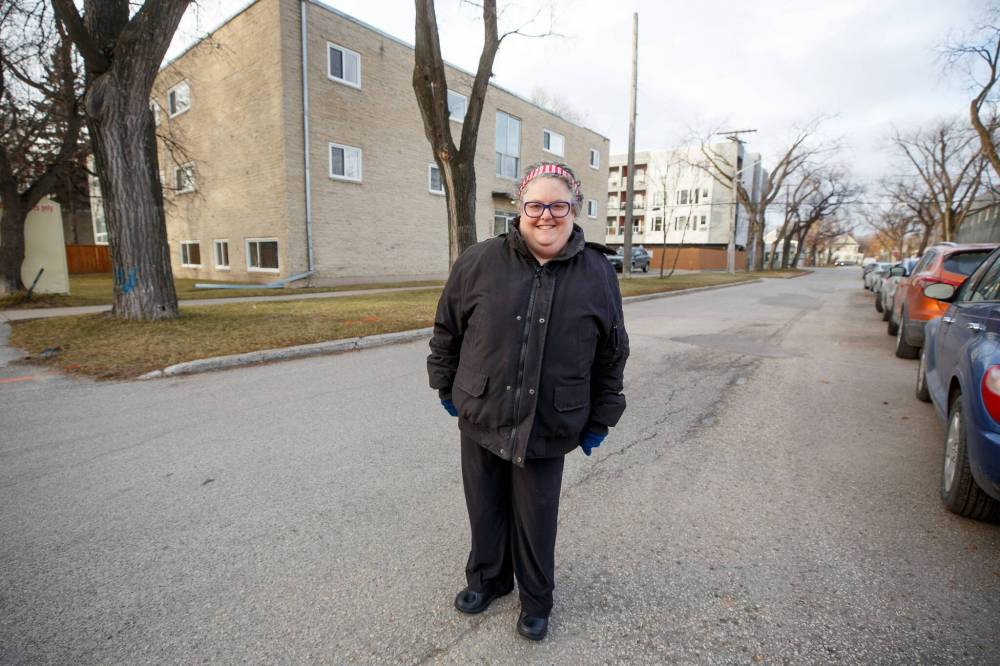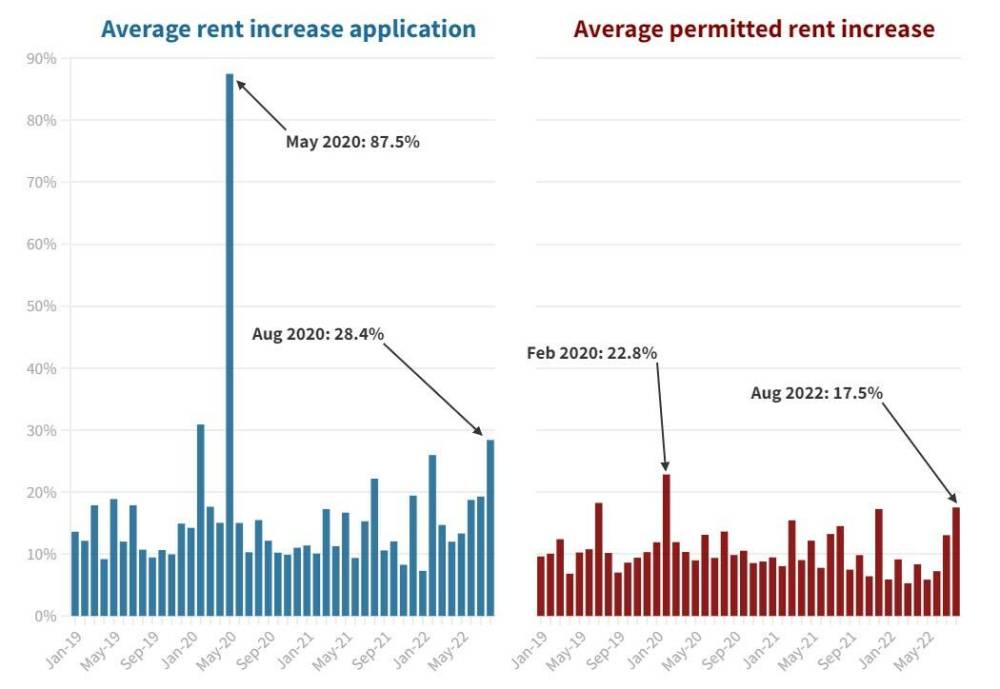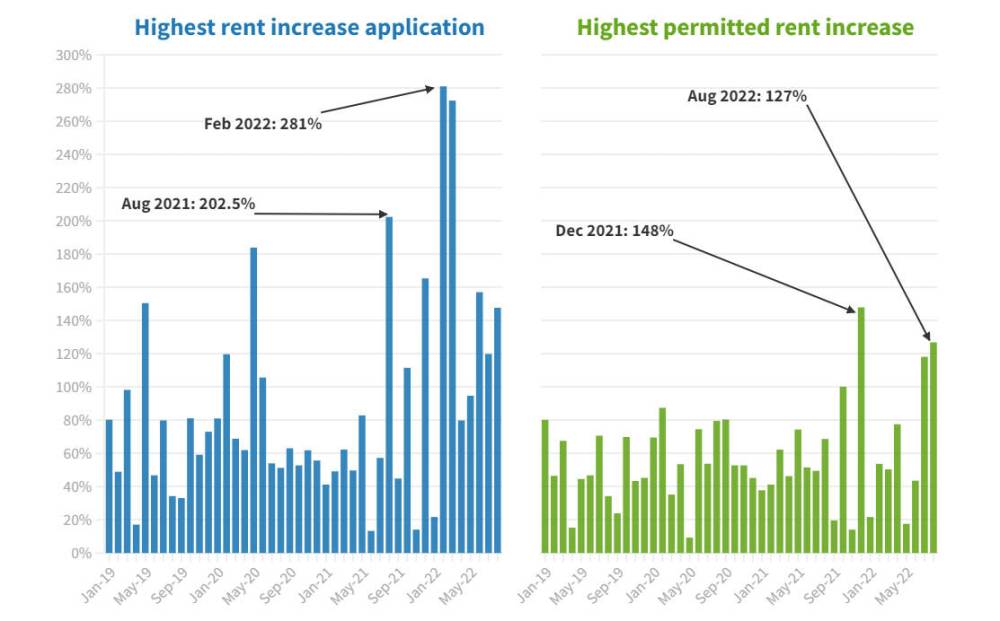‘They can’t afford food… they can’t afford rent’
Housing advocates raise alarm as Residential Tenancies Branch allows landlords to raise rents an average of nine per cent this year
Advertisement
Read this article for free:
or
Already have an account? Log in here »
To continue reading, please subscribe:
Monthly Digital Subscription
$19 $0 for the first 4 weeks*
- Enjoy unlimited reading on winnipegfreepress.com
- Read the E-Edition, our digital replica newspaper
- Access News Break, our award-winning app
- Play interactive puzzles
*No charge for four weeks then billed as $19 plus GST every four weeks. Offer only available to new and qualified returning subscribers. Cancel any time.
Read unlimited articles for free today:
or
Already have an account? Log in here »
Hey there, time traveller!
This article was published 10/11/2022 (776 days ago), so information in it may no longer be current.
Cash-strapped tenants are tightening budgets or packing bags following hefty rent hikes approved by the Residential Tenancies Branch — despite the Progressive Conservative government issuing property tax rebate cheques to Manitoba landlords amid a two-year rent freeze.
The branch permitted landlords to raise tenants’ rent by an average nine per cent, with hikes ranging between five and 126 per cent, in the first half of 2022. The province set rent control guidelines at zero per cent for both 2022 and 2023.
The branch, which is responsible for assessing landlords’ requests to raise rent above the limit, has processed 230 applications, which affect an estimated 10,000 units, in this calendar year.
“How can we keep affording an apartment if this keeps happening?” said Samantha Smith, a longtime member of the West Broadway Tenants Committee and a disability advocate. “I feel so bad for people in these predicaments.”
The tenants committee formed about five years ago, in response to worsening affordability and housing challenges in the west central Winnipeg neighbourhood. The collective of renters organizes workshops, provides advice on working collaboratively with landlords, and has successfully advocated against excessive rent hikes.
Despite her tenure with the committee, Smith said she continues to be shocked by how often landlords apply for and receive permission to raise rent above the guideline, which has typically been tied to inflation.
MIKE DEAL / WINNIPEG FREE PRESS Samantha Smith, a member of the West Broadway Tenants Committee, says renters who face increases higher than the provincial guidelines often have to move. The committee has successfully argued against excessive rent increases.
According to figures obtained by the Free Press, West Broadway was in the top five Manitoba postal codes for above-guideline increases, based on the number of units approved for a hike, between 2019 and 2021.
Smith said neighbours have had no choice but to move when faced with such a hike and, in many cases, tenants did not see a meaningful improvement to their home to reflect the inflated rent.
“They can’t afford food, and they can’t afford rent… I don’t know how people keep doing this, and I don’t know how they expect to keep doing this,” Smith said. “Unfortunately, it’s happening all over the city.”
High success rate for increase approval
So far this year, landlords have asked the RTB to approve an average rent increase of 17.46 per cent, with some particularly ambitious owners seeking a more than 280 per cent increase for their rental property.
Landlords can apply for above-guideline increases when operating cost increases and costs of any capital improvements are greater than the guideline.
Yutaka Dirks of the Right to Housing Coalition Manitoba said landlords have significant incentive to apply for an above-guideline increase (or AGI), given the extremely high success rate.
“They may not get everything they’re asking for, but they will get an increase above the guideline,” said Dirks, who also works for the Canadian Centre for Housing Rights.
“I think that really points to a weakness in the rent regulation system, because if it’s just sort of proforma that landlords are able to get an increase above the guideline, that is definitely a problem.”
”If it’s just sort of proforma that landlords are able to get an increase above the guideline, that is definitely a problem.”–Yutaka Dirks
The Residential Tenancies Branch does not proactively disclose information about AGIs, but provided some statistics in response to a request by the Free Press.
Between 2019 and 2021, the branch ruled on 912 applications for AGIs, which affected nearly 60,000 units. Tens of thousands of tenants had their rent increase by an average of 10.8 per cent, 11.65 per cent and 10.3 per cent in 2019, 2020 and 2021, respectively.
The number of units affected by above-guideline increases this calendar year will not be available until early 2023. However, the branch is on track to process just as many applications as 2021, when just eight requests were withdrawn owing to a lack of justification for the increase, and more than 16,000 units were affected.
Dirks said the trend of landlords skirting rent control by applying for AGIs has compounded the housing affordability crisis in Manitoba.
Each year, fewer private market rentals are available to the lowest-income earners and people on fixed incomes, including seniors.
When taken with 40-year record-high inflation and stagnant wages, the unexpected, double-digit rent increases can amount to “economic eviction,” Dirks said.
1 in 4 renters in core housing need
“For those Manitobans who are living on low income, they face a housing market that is really inaccessible,” he said. “To have your rent increase by almost 10 per cent is just pushing a lot of people into some precarious positions.”
The provincial government estimates 40 per cent of Manitoba households pay monthly rent.
About one in five Manitoba renters was in core housing need — meaning their accommodation was too expensive, crowded or poor quality — in 2021, according to Statistics Canada. In Winnipeg, one in four renters was in core housing need.
The average one-bedroom apartment in Winnipeg rents for $1,030 a month, based on the Canada Mortgage and Housing Corp.’s 2021 rental market survey.
When the province announced it would freeze rents for two years in 2021, it was billed as an affordability measure to help tenants and to account for the education property tax rebate cheques being sent to residential property owners across Manitoba.
In 2022, landlords received a 37.5 per cent rebate on their school taxes, and will receive a 50 per cent rebate in 2023. The education property tax rebate cost the province just under $350 million this year.
At the time, critics argued the rent freeze would be of little benefit to renters, given the high success rate for above-guideline increase applications; the government said the Residential Tenancies Branch would factor the rebate into its decision making.
A private member’s bill to limit the expenditures included when considering an AGI and only permitting AGI applications for “extraordinary increases” in utility costs, taxation or capital expenditures was introduced by NDP MLA Adrien Sala earlier this year.
“We need to ensure that we fix this legislation that frankly is broken right now and is causing runaway, above-guideline increases.”–Adrien Sala
While the bill died when the session ended last week, it received favourable comments from PC members, with McPhillips MLA Shannon Martin saying: “I do believe that Bill 218 does have some legitimate components… We have to ensure that renters at all instances aren’t being extraordinarily put upon in terms of rent increases that aren’t justified.”
Sala said the bill will be reintroduced during the next legislative session, which begins Tuesday.
“We are allowing this issue to persist by our failure to do something about it,” Sala said. “We need to ensure that we fix this legislation that frankly is broken right now and is causing runaway, above-guideline increases.
“We need to shift the balance back in favour of renters in this province.”
‘Who is market housing for?’
Housing advocates agree regular property maintenance and improvements are important to tenants, but policy reform is needed to strengthen regulations, offer housing security and give renters a voice during the adjudication of AGIs.
“The priority needs to be that this isn’t a way for landlords to go around a strong robust rent regulation system that protects the affordability of homes for tenants,” Dirks said.
Consumer Protection Minister Reg Helwer was unavailable for an interview on above-guideline rent increases Thursday, press secretary Ross Romaniuk said.
University of Manitoba assistant professor of city planning Sarah Cooper said the province will be forced to engage in the affordable housing crisis sooner than later, as more people are displaced owing to rising rents and a dearth of public and non-profit options.
Increased investment by the government in public, non-profit housing is part of the solution, Cooper said.
“It’s a question of who is market housing for? And if the government has a goal of maintaining low-cost housing in the private rental market, then it needs to find ways to keep that housing affordable,” she said.
“That lowest end of the market, if that’s being renovated up, even if it’s totally justified, that’s still a policy issue for government, because they’re still going to have to figure out how to house people.”
danielle.dasilva@freepress.mb.ca

Our newsroom depends on a growing audience of readers to power our journalism. If you are not a paid reader, please consider becoming a subscriber.
Our newsroom depends on its audience of readers to power our journalism. Thank you for your support.







